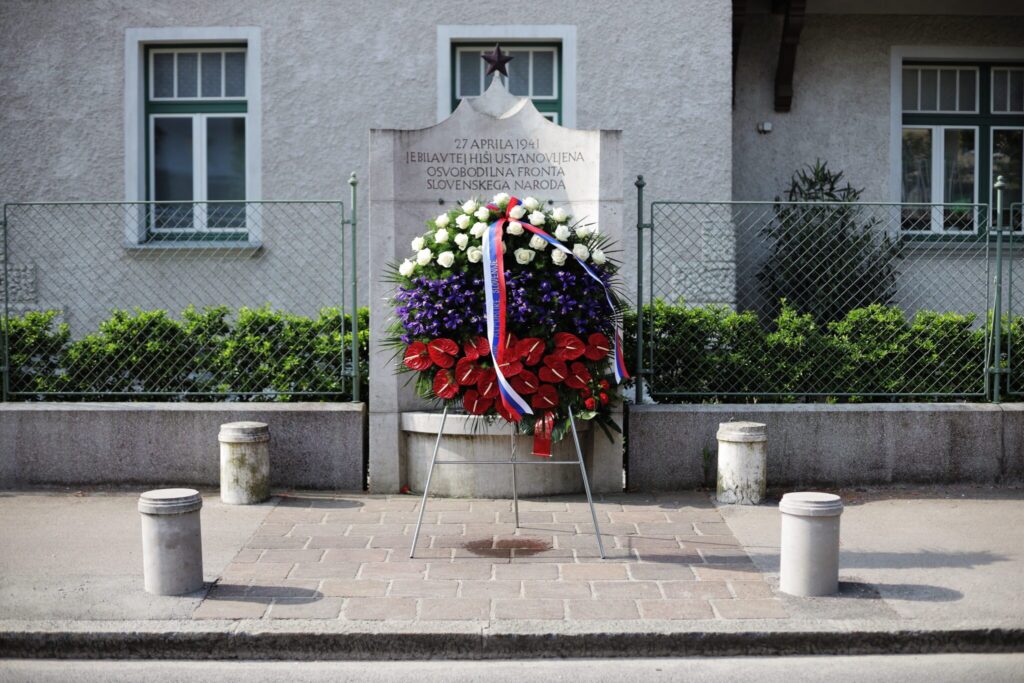On Thursday, Slovenian international socialists celebrated the fact that, by an accidental turn of events in history, they unexpectedly found themselves among the winners of the Second World War, even though, at the start of the war, they were among the losers. Namely, the 27th of April is celebrated nationally as “The Day of Uprising Against the Occupation” – the day when the communists decided to fight together against the Western imperialists.
On Thursday, 82 years have passed since the famous meeting in Vidmar’s Villa in Ljubljana, where communists, Christian socialists, hawks, the Angela Vode women’s movement, culturalists and Nagode’s Old Guard gathered. According to the official version of events, it was there that the fateful breakthroughs of the struggle against the occupier and the anti-fascist fight took place, but many documents and testimonies tell us the opposite.
In fact, witnesses who attended the meeting said that they did not even talk about Nazi fascism, as the non-aggression pact between the Soviet Union and Nazi Germany was still in force at the time. Instead, they directed their “resistance” against the Western capitalist countries (the USA, the UK, and France), calling themselves the Anti-Imperialist Front at their first meeting. They positioned themselves as the Liberation Front against Nazi fascism only later, when their “friend” Adolf Hitler unexpectedly attacked the main godfather of the Slovenian and Yugoslav communists – the Georgian monster Joseph Stalin. They were therefore founded primarily as a sub-branch of Nazi fascism, and years later, they were accused of flirting with Nazi Germany by one of their participants, Angela Vode, who in turn was pushed to the margins of society by the communists.
The Slovenian communists have already abolished the holiday once – out of fear of the Serbians
The holiday of the Day of Uprising Against the Occupation was adopted in post-war socialist Slovenia in 1948 and was celebrated as the most sacred of all the holidays until 1951. Then, the members of the then-Slovenian government abandoned the celebration of the 27th of April and set the 22nd of July as the main holiday, which was called the Day of the Uprising, and symbolised the day when the first partisan guns fired in occupied Slovenia. In reality, this Day of the Uprising was more or less a made-up Party myth, based on a rather insignificant event – the attack by three Communists who fired from the woods and wounded a Slovenian-born gunman, Franc Žnidaršič. The people behind the “erasure” of the Day of Uprising Against the Occupation in 1951 were the pro-Yugoslav Communists of the time, who did not want to create disputes between the Yugoslav republics over the dates and the start of the fighting. Namely, the Serbians celebrated the Day of Uprising on the 7th of July.
Kocbek did not trust them because of their pact with Hitler
Edvard Kocbek talks about the beginnings of the Liberation Front in his diary entry, when special awards were presented to the participants of the founding meeting on the occasion of the thirtieth anniversary. “First: the history of the National Liberation Movement does not know of any official founding of the Liberation Front. Even the Anti-Fascist Front was not founded, because it existed before the break-up of Yugoslavia. This date was created manipulatively, Kidrič needed a date of foundation, and that is why a debate meeting at Vidmar’s Villa was proclaimed as the historical date of the founding of the Liberation Front,” writes Andrej Inkret about Kocbek’s memoirs in the book “And The Century Will Blush” (“In stoletje bo zardelo”).
“The second time, I was not present at that debate meeting because I was rightly suspicious of the communists at the time of Hitler’s pact with Stalin.” Kocbek refused to talk to them until after Hitler’s attack on the Soviet Union, and according to him, the real Liberation Front only began to take shape in the summer of 1941, when the Christian Socialists also began to take an active part in the fight.
So what are we actually celebrating?
We are celebrating, first and foremost, a reminder that the Slovenian and Yugoslav communists were initially the original collaborators of National Socialism, as introduced by Hitler in Germany, because it was perfectly complementary to the communist struggle against the rich and the capitalist countries. The holiday, like the annual pilgrimages to Dražgoše, is a modern grotesque, an insult to the memory of all the victims of Nazism, fascism and communism, and above all, an opportunity for the modern left to tell its voters on the left that the greatest evil in the world is capitalism, and that they fought against it more than 80 years ago.
Andrej Žitnik


